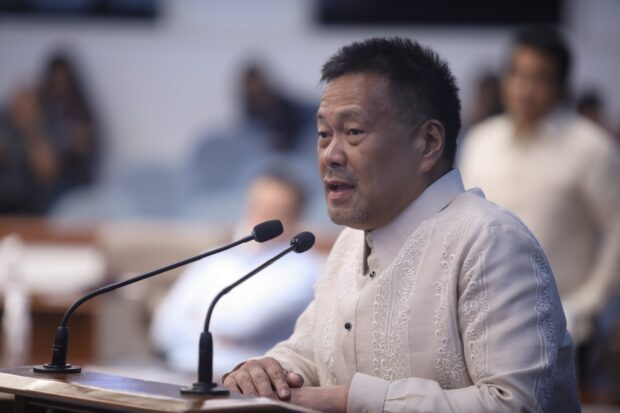Drug firm in Senate probe denies ‘pyramiding’ accusations

Sen. Joseph Victor “JV” Ejercito BIBO NUEVA ESPAÑA/SENATE PRIB
MANILA, Philippines — A Filipino-owned drug distributor on Saturday rejected allegations that it recruited doctors in a “pyramiding scheme” to prescribe its medicines to their patients in exchange for huge commissions, including expensive cars and other luxury items.
In an emailed statement sent to the Inquirer, Bell-Kenz Pharma Inc. described the claims as “misinformed and unfounded” and that the company was willing to face separate investigations by the Senate and the Department of Health (DOH).
READ: DOH to probe docs, pharma firm over marketing scheme
Sen. JV Ejercito had filed a resolution on Thursday seeking a legislative inquiry after a group of patients, doctors and officials of other pharmaceutical companies informed him about Bell-Kenz’s supposed questionable business practice.
Sen. Christopher “Bong” Go, chair of the Senate committee on health and demography, had immediately set the first hearing on the issue on April 30.
Health Assistant Secretary Albert Domingo said the DOH and the Food and Drug Administration had already tasked a team to look into the complaints against the pharmaceutical company and its affiliated doctors.
“Bell-Kenz Pharma Inc. vehemently deny the misinformed and unfounded allegations leveled against our company,” it said in reply to the Inquirer’s request for comment on the allegations.
“Our commitment to rectify these accusations in the right fora underscores our unwavering dedication to preserve the integrity of our company’s reputation,” it said.
‘Whistleblowers’
The company, it added, was devoted to its mission of providing “cost-effective medications” to help ensure “equitable access to high-quality health care for all.”
“Since our inception, Bell-Kenz has been steadfast in our pledge to serve all Filipinos,” it said. “Upholding the ethical standards of the local healthcare industry is paramount to us and we wholeheartedly endorse endeavors aimed at upholding the sanctity of the medical health-care system.”
The pharmaceutical company, however, did not directly respond to the allegations that its shareholders were doctors who had been directing their patients to take the medicines that Bell-Kenz was importing.
The allegations were first made in a post on Reddit in 2022 by a person who claimed to be a former company employee and reposted by public health advocate Dr. Tony Leachon on his X account early last week.
According to Ejercito, a group of “whistleblowers” had told him that the company was engaged in a type of “pyramiding or networking” scheme wherein the doctor-shareholders recruit other physicians to invest in the company and to prescribe its products, mostly for lifestyle diseases, such as diabetes, hypertension and cardiovascular conditions.
The doctors, he said, would then get hefty “rebates” or commissions that included sports cars, luxury watches, foreign trips and other gifts.
Ejercito said such marketing system undermined the intentions of the Universal Health Care (UHC) Act, which he had authored, to help bring down the medical expenses of Filipinos.
Breach of ethical standards
“We passed the UHC law because we wanted to lower the cost of medical expenses. If there are doctors prescribing medicines that you don’t really need, it would only add to the expenses of Filipinos,” he said.
“There’s really a clear breach of ethical standards,” Ejercito said, citing doctors peddling their own company’s medicines. “That’s clearly a conflict of interest.”
In the annual financial report it submitted to the Securities and Exchange Commission on April 3, 2023, Bell-Kenz reported a gross revenue of over P6.8 billion and a net income of nearly P312 million in 2022. A year prior, it reported a gross revenue of more than P5.6 billion and a net income of almost P245 million.
A check made by the Inquirer shows that company president and CEO Luis Raymond T. Go and chief financial officer Jaime F. Cayetano Jr., who both signed the financial report, are cardiologists at the state-run Philippine Heart Center (PHC) in Quezon City.
Bell-Kenz’s head office is just behind the PHC complex and East Avenue Medical Center.